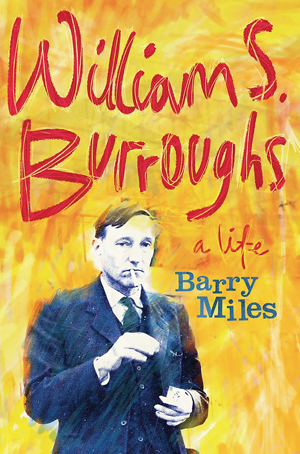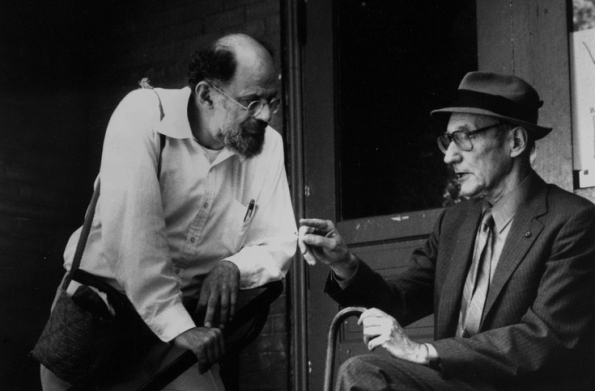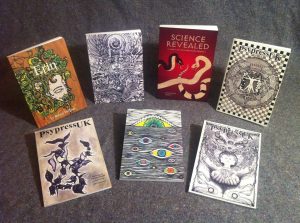Archive
William S. Burroughs: A Life
 What follows is an extended review of Barry Miles’s biography: William S. Burroughs: A Life (American title: Call Me Burroughs: A Life), which was published in February 2014 to mark the centenary of Burroughs’s birth.
What follows is an extended review of Barry Miles’s biography: William S. Burroughs: A Life (American title: Call Me Burroughs: A Life), which was published in February 2014 to mark the centenary of Burroughs’s birth.
The review first appeared in the Psychedelic Press magazine Vol IV 2014, and has never before been online. It is reprinted now because of its in-depth quality and the fact it provides a whistle-stop tour of Burroughs’s life through the lens of Barry Miles’s updated facts.
Barry Miles is no stranger to writing about William Burroughs or the wider Beat scene. He had known Burroughs and been part of his circle since the mid-1960s, when Burroughs lived in London, and has catalogued his work, collaborated with others on restored texts of his novels and has written a portrait of Burroughs, El Hombre Invisible, which for many years has served as the standard primer or introduction to the life and work of the man. Miles has also penned biographies of Kerouac and Ginsberg and other works related to the Beats, such as The Beat Hotel. He therefore seems ideally equipped to write this new definitive biography of Burroughs, published to coincide with the centenary of the author’s birth in 1914.
As he tells us in the introduction, Miles had a hand in the making of the myth of Burroughs, a phenomenon which has now become so powerful that it has ensured Burroughs a place as a character in history independent of his place in the hall of great writers. It was in 1984 that Miles discovered a lost Burroughs manuscript, Interzone, which together with another from the past that he’d previously uncovered was instrumental in getting Burroughs a new publishing deal. That other manuscript was Queer, Burroughs’ second novel, written in the early ’50s but never published at that time. In the ’85 edition Burroughs supplied a short introduction, a few pages of autobiographical background that were to prove seminal in establishing the Burroughs ‘myth’.
Read more on: Medium
The Beat Writers and the Psychedelic Movement

Allen Ginsberg & William Burroughs in later years.
This article was adapted from my talk at Breaking Convention 2015, held in London at Greenwich University. It has now been published by the excellent Oak Tree Review, which investigates the many branches of psychedelic culture throughout history, specialising in its manifestations in art and literature.
In their activities and writings in the late 1940s and ’50s the Beat writers – principally Jack Kerouac, William Burroughs and Allen Ginsberg – prefigured and influenced the Psychedelic Movement, which came into flowering a generation later. When those epoch-making cultural changes got underway in the ’60s, the Beats were naturally looked upon as mentor figures and elder statesmen, and Timothy Leary, who was of the same age group as them, was happy to recruit and induct them into the cause – through his Harvard program. This produced some unexpected and volatile results – Tim Leary got more than he bargained for – and the end product as regards the three major Beat writers was one spectacular success, one mixed case, and one spectacular failure.
It all started in New York in 1943, within the Columbia university scene where the Beats first hooked up. At the time Jack Kerouac was in his early twenties, and already saw himself as a writer. Bill Burroughs was older, in his late twenties, and was known as a raconteur and intellectual, and became a mentor figure to the group. Allen Ginsberg was the kid, still a teenager, and just enrolled at Columbia. There were other key people in the group, such as Lucien Carr, another student, and everybody became fictionalised in Kerouac’s novels – most notably On the Road.
At around this same time Burroughs first tried morphine and became an addict, so the events of his first novel Junkie run roughly concurrently to On the Road. In both books, which are strongly autobiographical, there are many references to recreational drug use, and they open a marvellous window onto pre-psychedelic bohemian life – exactly the kind of scene which would develop eventually into the hippie scene.
Read more on: The Oak Tree Review
The Beat Writers and the Psychedelic Movement
My Breaking Convention talk from July 2015 is now up on YouTube.
In their writings and lifestyle experiments, the Beat writers Kerouac, Burroughs and Ginsberg were very much the precursors of the psychedelic movement – in particular with regard to their employment of drugs for recreational and psychonautic purposes. They were pioneering users of ayahuasca, mescaline, psilocybin and LSD; and when Timothy Leary began his Harvard work he naturally tried to induct the three as elder statesmen figures. The results were somewhat volatile and unexpected, with one resounding success, another a mix of good and bad, and another a resounding failure. Nevertheless the Beats remain highly influential figures and today’s psychedelic culture would not be the same without them.
To Soar Angelic Even Higher – Psypress UK Latest Issue & Crowdfunder
The 2014 Volume 3 issue of the acclaimed Psychedelic Press journal is out now, and it contains my extended article ‘Beats on Acid’, about what happened when the original hipsters encountered the new 1960s era of tripping. Allen Ginsberg took mushrooms, declared himself ‘the Messiah’, and plotted with Timothy Leary to turn on the world. Meanwhile Neal Cassady passed the Acid Test with Ken Kesey and drove the legendary bus ‘Furthur’ off into the sunset and immortality. But for Bill Burroughs and Jack Kerouac, the transition wasn’t that simple…
Interest in and information about ayahuasca has expanded exponentially in recent years, and the Psypress journal is the place to find out the latest. Author and workshop coordinator Ross Heaven asks the question ‘What is Ayahuasca Tourism?’ and whilst painting a very eye-opening picture of the current Amazonian ayahuasca scene, he concludes there is no definitive answer, with perhaps more pluses than minuses to the so-called ‘Western invasion’. Nathan D. Horowitz gets down to business with a florid and lyrical Ecuadorian ayahuasca trip account, which sustains vivid narrative intensity. And on a related note, Andrew R. Gallimore gets inside the DMT-influenced brain and shows how altered neurology engenders a more fluid model of reality.
In the more academic realms, James W. Jesso explores the parallels between Sufism and psilocybin as a spiritual tool, and John Glynn looks at the literature of the chemistry of psychotomimetic drugs, relating it to mental illnesses such as schizophrenia and also psychedelic therapy. In other articles, Roger Green gives a detailed analysis of Aldous Huxley’s entheogenically utopian novel Island, and Mike Jay considers the lotos-eaters of myth and antiquity. And finally editor Robert Dickins meditates on the ego and ego-loss in psychedelic experience, touching on Freudian theory and the works of Huxley again, but mainly on Alan Watts and his seminal piece of trip-lit The Joyous Cosmology. To obtain a copy of the journal, click here.
The range, depth and variation of the subjects explored, plus the obvious expertise of the authors makes for a lively and didactic read; and again the journal shows that the hundred-page digest format – a volume to hold in your hands – cannot be beaten in many ways, and ideally compliments the keyboard-and-screen experience of the internet. The journal has been going for two years now, and Rob plans to make it bi-monthly and also obtain new computer equipment, redesign the Psypress website and publish more books to expand the existing collection.
To this end Rob has launched a crowdfunder appeal with the aim of raising £5,250. As I write, £725 or 13% of the target has been reached and I urge you to contribute and spread the word around and get Psypress up to the next level. Rob has worked tirelessly over the past five years to build this portal of psychedelic information, and his achievement to date is most impressive. He says:
The Psychedelic Press aims at two things: 1) To be a public forum for psychedelic and curious culture, and 2) to raise awareness about the therapeutic, medical, and cultural significance of psychoactive plants and chemicals, through the publication of a range of media.
There are various gifts on offer in exchange for donations, such as copies of the journal, subscriptions, copies of Andy Roberts’ excellent book Albion Dreaming: A Popular History of LSD in Britain, Psypress T-shirts and original artwork, depending on the level of donation. I have donated and I eagerly await the arrival of my T-shirt! More information here.





